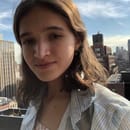I first declared myself a feminist when I was twelve years old. It was kind of getting impossible not to—it was 2015, I was just old enough to get a sugar-coated grasp of the political turmoil that was ahead, and the window into the world that I got made me quite simply angry.
I was introduced to the brand of feminism that most of my peers were that I think could be summed up perfectly with what my Instagram bio was for most of early high school: “A woman’s place is in the House and the Senate” (god, I loved that slogan.)

This is liberal feminism, and its definition is quite literally in the name. Liberal feminism seeks gender equality within the framework of liberal capitalism, emphasizing values of individualism, autonomy, and political or economic power. Because it operates within liberal capitalism, liberal feminism advocates for equality through reformism and the climbing/diversification of political and corporate hierarchies—so, more female politicians and CEOs is essentially the thesis.
I worshipped liberal feminism for most of my politically-conscious life. I, like most girls, felt disenfranchised in class, ignored, angry, insecure, and there was quite literally nothing that gave me more bliss than a woman in a pantsuit marching through Washington D.C. But, as you can guess by the title, this is about how my relationship with feminism changed. At some point amidst the fiery chaos that was my teen years, I realized that the feminism that shaped my values, my sense of personhood, and everything in between, had failed me.
In tenth grade, I was doing research for a project and stumbled upon an article about the very woman that I formed my early political opinions around: Hillary Clinton. This is likely old news—it was about how she had coined the term “supercriminals” to perpetuate stereotypes about the criminality of black men and feed into the War on Drugs.
This was the woman whose campaign ads featured girls like me looking in the mirror and loving their bodies. And, yet, despite her pantsuit and her slogans, she had utilized her political power to further a movement of mass incarceration and ripping families apart. A woman at the podium didn’t make it any less violent.
Here lies the fatal flaw of my old brand of feminism. I spent too long analyzing patriarchy without looking at the structures it is informed by. I analyzed my womanhood without acknowledging how it is interconnected with my race, religion, sexuality, etc. I argued militaries and police forces would be cured if they were woman-led without recognizing their inherent violence. I gifted Clinton the platform to call people “supercriminals” while leaving dry the women ripped apart by the War on Drugs.
Slowly, and then all at once, I started to notice other off-putting things about my feminism. I noticed how it would be co-opted by brands’ ad campaigns to sell products, like razors and makeup. I noticed how we reduced politicians to their identities, supporting them unconditionally without being genuinely critical of their policy. I noticed how discussions of misogyny rarely included trans or nonbinary people. I noticed whenever a feminist movement, such as the Me-Too movement, gained traction in the mainstream media, it emphasized the voices of upper-class white women. I noticed how many of the leaders of women’s suffrage and the right to vote had simultaneously vocally opposed black suffrage.

I have grown dramatically since that moment in tenth-grade. And because of writers and activists like Rosa Luxemburg and Angela Davis who have given me the language and theory to further my mindset, I have realized the elements of the liberation of women that my old feminism was missing.
First of all, feminism is a collectivist struggle. While liberal feminism emphasizes hyper-individualism, this only really empowers white and economically stable women who have the means to succeed within capitalism. If you are only fighting for changes that are sufficient for you and women who look like you, it is not feminism. No one fights alone.
Second of all, feminism is intersectional and inclusive. Liberal feminism analyzes the oppression of women absent of how race, class, religion, etc. affects their experiences. It views the various facets of our identities as isolated forces. Intersectionality is the opposite. It critically analyzes how they inform each other. For example, as white women, we have a history of weaponizing our perceived weakness under patriarchy to be racist—this is where the stereotype of “Karen’s” comes from.
Third of all, effective feminism challenges patriarchy structurally. When I was younger, my feminism was geared towards climbing hierarchies without questioning the history of those hierarchies as a whole. I have since realized that I do not want equality with men if it means assuming a position that is oppressive. Health care is a women’s issue. Education is a women’s issue. Poverty is a women’s issue. Imperialism is a women’s issue. Effective feminism dismantles hierarchies instead and rebuilds ones that are inherently equal. I really recommend anyone interested in this kind of feminism to learn about Rojava, the autonomous socialist zone in northern Syria.
And, finally, growth is everything! I am not a finished product, politically or otherwise and neither should you be. I am fallible, mistake-prone, and learning, and I want this to be nothing if not an example of that. To be a feminist is to recognize the humanity in everyone, and not only their imperfections but what they’re capable of. I will keep learning, keep trying, keep making mistakes—and who knows, maybe in a few years, I’ll come back to this article and have some revisions to make.



